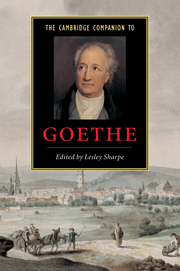Book contents
- Frontmatter
- Introduction
- 1 The world Goethe lived in
- 2 Goethe the writer and literary history
- 3 Goethe the poet
- 4 Goethe the dramatist
- 5 Faust
- 6 Weimar Classicism
- 7 Goethe and the Weimar theatre
- 8 Goethe’s prose fiction
- 9 Autobiographical writings
- 10 In defence of experience
- 11 Goethe and gender
- 12 Goethe and the visual arts
- 13 Goethe and the political world
- 14 Religion and philosophy
- 15 Reception in Germany and abroad
- A guide to further reading
- Index
Introduction
Published online by Cambridge University Press: 28 May 2006
- Frontmatter
- Introduction
- 1 The world Goethe lived in
- 2 Goethe the writer and literary history
- 3 Goethe the poet
- 4 Goethe the dramatist
- 5 Faust
- 6 Weimar Classicism
- 7 Goethe and the Weimar theatre
- 8 Goethe’s prose fiction
- 9 Autobiographical writings
- 10 In defence of experience
- 11 Goethe and gender
- 12 Goethe and the visual arts
- 13 Goethe and the political world
- 14 Religion and philosophy
- 15 Reception in Germany and abroad
- A guide to further reading
- Index
Summary
Johann Wolfgang Goethe (1749-1832) was the first German writer of unquestioned European stature. And no other writer of his stature has his range and diversity. Author at the age of twenty-five of the first German international bestseller, Die Leiden des jungen Werther (The Sorrows of Young Werther), his impact on the literary scene at home and beyond Germany's borders was immense. Throughout his long productive life (he finished the second part of Faust only months before his death in 1832) he continued to surprise his contemporaries with the freshness and unexpected new departure of each work. He was a supreme lyric poet who also produced masterpieces in the genres of drama, prose fiction and verse epic. He was a serious natural scientist, an art critic and art historian as well as a painter, a chronicler of his own life and times, a theatre director and actor, a Privy Councillor and administrator. He conducted a vast international correspondence and was acquainted and had dealings with many of the prominent political players of the time. His collected works, the amount known about his life, the amount written about it and about his works are all huge. While this volume cannot begin to do justice to its subject, it aims to give the reader approaching Goethe for the first time some sense of the character of his work, some impression of his achievement, and some awareness of and orientation in the critical debates that have raged and still rage over aspects of his work and status.
- Type
- Chapter
- Information
- The Cambridge Companion to Goethe , pp. 1 - 5Publisher: Cambridge University PressPrint publication year: 2002
- 1
- Cited by

